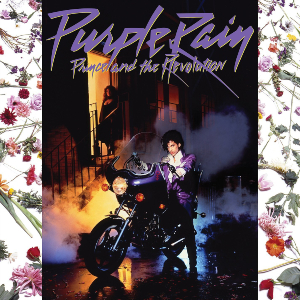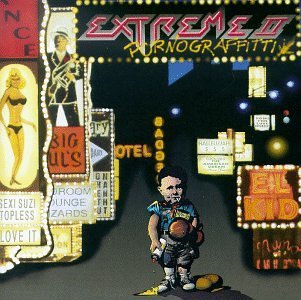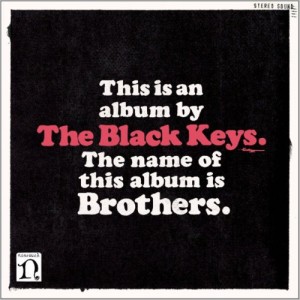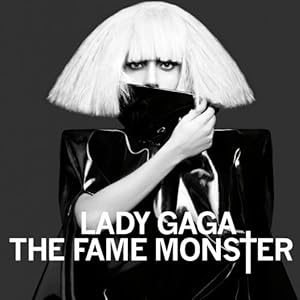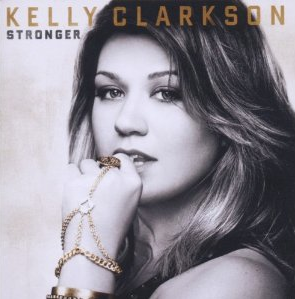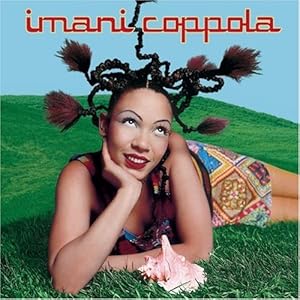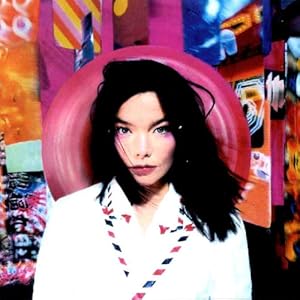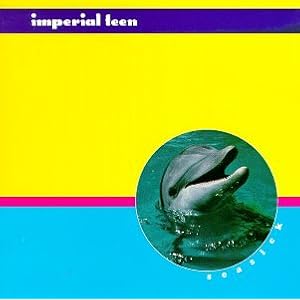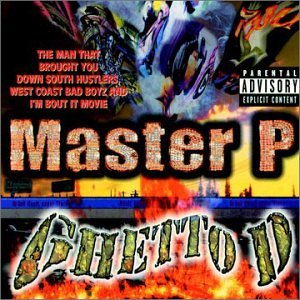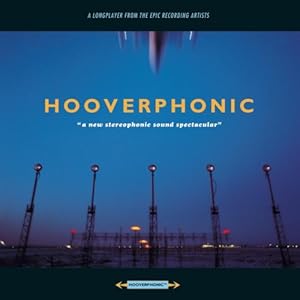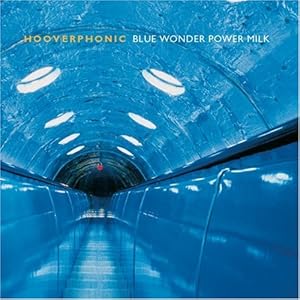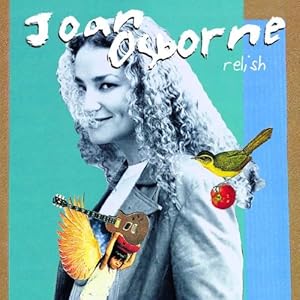Nice thread idea, Lazario.
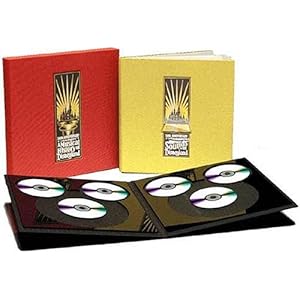
Without a doubt, the prized possession and absolute favorite item in my music collection is
A Musical History Of Disneyland. This 6 CD set features the soundtracks to ALMOST every attraction in the history of Disneyland, runs nearly 8 hours, and if that wasn't enough, is sequenced by "land", as if you are exploring the park by "land" almost in real time (but with no lines)! This excellent release is thoroughly reviewed by Luke here:
http://www.ultimatedisney.com/amusicalh ... yland.html
At this point, I could list other favorite Disney soundtracks (mostly from the parks and DACs), other, non-Disney musicals and film scores, classical, etc., as these genres represent most of what I listen to nowadays and could easily fill up 10 (or 30!) positions just from these categories.
However, in the "pop" spirit of this thread's responses so far, I am inspired to attempt to discuss my taste in "pop" music in great detail for the first times on UD (and by "pop", I don't mean just "commercial"; I simply mean ANY music classified and sorted by the name of the Artist (rather than soundtracks which are sorted by the name of the film or musical). So "rock", for instance, is a subset of "pop", in this context.
Pop music was a big part of my life throughout the 80's and early 90's. I have a pretty big background in the pop music of this era, having experienced it firsthand, both as an avid CD buyer, as well as spending quite a bit of time in music clubs during the late 80's through early 90's (both as a frequent patron and DJ in dance clubs and as a frequent patron in live music clubs). I also worked as a college radio DJ in the early 90's. So my list, with a few exceptions, focuses primarily on the music of the 80's and early 90's.
A few self-imposed rules:
a) I am imposing the "one album per artist" rule upon myself, to be able to discuss more artists this way. If I didn't, the Cocteau Twins and Beatles would take up multiple spots each, and my response would be more about them than anything else.
b) I will avoid live albums and singles/hits compilations. This means that a lot of deserving artists that I listen to often, but primarily on singles comps won't make the cut (ranging from Supremes/Motown, ABBA and Queen, to Depeche Mode and New Order, to name a few). It's not that their studio albums are bad; I just find myself listening to these artists (and many others) through singles collections more than on studio albums or any one, definitive, studio album.
c) In some cases I will discuss lyrics, but I MOSTLY get into music for the FEELING rather than the MEANING (kind of ironic, given my English major/writing background). Although my favorite musical instrument is the human voice, in many cases I find the emotion of HOW something is said, or sounds, more interesting musically than WHAT is actually said. But in any rate, many of these selections are based on the overall sound and ambience created by the recording.
d) I found it too hard to pick just 10 so I came up with 24 (featuring 13 "Honorable Mentions"). I will not attempt to make a distinction of where the "Main 10" end and the HM's begin; with the exception of the first two, these are listed either loosely by genre or in the order in which I thought of including them. The longish reviews (intended to simply express my own opinions and interpretations and do NOT attempt to speak universally), are for those interested, or, if not, one can just scroll past them to look at the pictures and bolded album titles

I had a lot of fun putting this together.
MY FAVORITE/MOST INFLUENTIAL POP STUDIO ALBUMS
 Cocteau Twins - Blue Bell Knoll (1988)
Cocteau Twins - Blue Bell Knoll (1988) - OK, since almost everyone reading this (except Lazario) has probably never heard of this band, I will gush a little about them before discussing this album. Recording from 1982-96, and hailing (mostly) from Scotland, Cocteau Twins were the shining star of the UK indie label 4AD.
Swirling, melodic, atmospheric guitars, (augmented by bass, drums, and at times keyboards/synth/piano), are highlighed by the beautiful, multitracked bliss that is Elizabeth Fraser's vocals. The words, especially in their early and perfectly brilliant middle period, (circa 84-90) are almost completely unintelligible and the result is instead of getting bogged down in "meaning", the voice is used solely as another instrument and conjures atmosphere, and "feeling". (On later 90's releases the words became (at times) more understandable, but thankfully the overall sound was just as unique and spellbinding as ever)
The net result of all of this is entrancing, hypnotic, spellbinding, ethereal, at times moody and haunting, at times overwhelmingly joyous, but almost always melodic and accessabile, once you "get" this band.
More about feeling than meaning, the abstract over the concrete, the impressionistic over the didactic...
And difficult music to describe other than pure sublime and ethereal bliss, and utterly not of this world...
Well, onto Blue Bell Knoll, then. This was basically the last CT album to feature the full mystique of not being able to clearly understand any of the words. As it was also perhaps the most musically accessable (up to that point) to a wide audience, but still mysterious, beautiful, and otherworldly, it makes for a good intro album for newbies. Standout tracks include:
"Carolyn's Fingers" - PURE SUBLIME EUPHORIC BLISS. And the angels sing. A perfect track to introduce newbies to the band from arguably their best album. "For Phoebe Still A Baby" is a beautiful midtempo lullabye, and "A Kissed Out Red Floatboat", has a trippy feel. This vocal tour-de-force is sung, as usual, with great feeling and a nice dynamic between Liz's higher and lower vocal range. There is not a bad track in the bunch, though.
Also recommended by this Artist - The entire catalogue, but my other faves include Treasure, an early masterpiece from 1984; Victorialand, a relaxing, ambient masterwork from 1986; The Moon and the Melodies, a 1986 collaboration between the band and noted ambient pianist Harold Budd; Heaven Or Las Vegas (1990), which broke the band to a bigger audience in the States and was an excellent follow-up to BBK. Also the sublime 4-track EPs Aikea Guinea and Love's Easy Tears, from 1985 and 1986, which are both found on the 2-CD EP and singles collection, Lullabies to Violane, spanning the band's entire career.
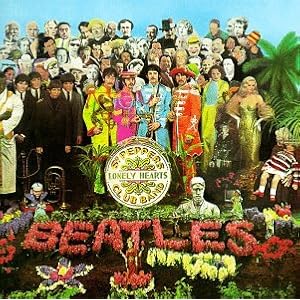 The Beatles - Sgt Pepper's Lonely Hearts Club Band (1967)
The Beatles - Sgt Pepper's Lonely Hearts Club Band (1967) - The Beatles of the early Beatlemania era wrote and recorded a lot of good music, most of which were love songs and were relatively musically straightforward compared to later work. By 1965's Rubber Soul album, the musical arrangements had become more sophisticated, and this continued even further on 1966's Revolver. Also on Revolver more and more songs abandoned the "silly love songs" lyrically in favor of more trippy lyrics ("I'm Only Sleeping", "Tomorrow Never Knows"), which for my tastes is a Very Good Thing.
On Pepper, the band spent even more time in the studio than on Revolver, creating essentially a "Technicolor" record that completely reinvented the band and their sound. The basic rock arrangements were replaced with more complex, colorful ones in which strings, woodwinds, brass, sitar, and others were just as likely to be featured as guitar, bass, and drums. Lyrically, we enter the psychadelic, colorful world of John Lennon's "Lucy In the Sky With Diamonds", and his equally trippy, circus-flavored "Being For the Benefit of Mr. Kite"; and the hazy daydreams of the stunning finale "A Day In the Life". Paul Mc Cartney contibuted the album's overall concept and several fun, colorful, upbeat numbers, including the lead-off, title track, which segues into the equally catchy "With A Little Help From My Friends", in arguably one of the most famous pop segues of all-time. George Harrison also made a huge contribution with the sitar-heavy, meditative, Eastern spirituality of "Within You, Without You". There isn't a bad track on the album, and it is sequenced in such a way that is clearly intended to be listened to in order, as a complete work, with the songs flowing together.
Ironically, two of the best known and loved songs from these sessions, "Penny Lane" and "Strawberry Fields Forever", were released as a single and therefore excluded from the album which was frequently a silly custom of the time (even though these colorful songs would have fit perfectly musically and lyrically). But this wrong was somewhat righted when these songs surfaced on the Magical Mystery Tour album later that year, joining the 6 tracks from the MMT EP and 3 tracks from other 1967 "orphaned singles" to create a compilation that was essentially a studio album, being as all the material was recorded during or just after the Pepper sessions.
Also recommended by this artist - Magical Mystery Tour, Revolver, Abbey Road, The Beatles (aka "The White Album"), the rest of the band's catalog, and the solo careers of the group members.
 The Smiths (1984)
The Smiths (1984) - "It's time the tale were told/Of how you took a child/and you made him old". These are the first words of "Reel Around the Fountain", the first song on the first Smiths album, and appropriate ones, given the album's recurring lyrical theme of innocence. With their "back to basics" guitar/bass/drums/voice sound, the Smiths, from Manchester, UK, stood out from most of the rest of the music on the charts in the 80's, which was becoming increasingly synth-based and heavily produced. Lyrically, this album is sort of the antithesis of music like the Cocteau Twins, as the lyrics are extremely important to getting the most out of the band. Singer and lyricist Morrissey became essentially a "poet laureate" of the UK indie/alternative scene of the mid 80's, and the lyrics stand up well on their own. However, when the guitar sounds and arrangements of songwriter/guitarist Johnny Marr are added to the mix, they become even more special, and a band of legend is born.
Standout tracks include the trilogy of songs that close the first half of the album - "Miserable Lie", "Pretty Girls Make Graves", and "The Hand that Rocks the Cradle". These tracks flow together perfectly, with the emotional lyrics of each building on each other and culminating with "Cradle", a touching, cathartic, lullaby to innocence and the desire to preserve and protect it - sort of a "Baby Mine" for the indie rock scene and sung by a male. The album also includes the band's anthemic first three singles - "Hand In Glove", "What Difference Does It Make", and "This Charming Man". The closing track, "Suffer Little Children", is a tearjerking tribute to the children who were victims of the horrific Moors Murders in Northern England in the 60's, sung with forlorn sadness and featuring gentle guitar riffs that both display a deep sensitivity - again, voice/lyrics and music compliment each other perfectly. This final track foreshadows "Meat Is Murder", a touching eulogy to the animal victims of the barbaric and cruel meat industry, that would close the band's second studio album of that same title. The Smiths, and later Morrissey as a solo artist working with new musicians, would go on to make lots of other great albums - but none would ever equal this refreshing simplicity, or be as raw, poetic, and achingly beautiful as this first effort.
Also recommended by this artist - entire catalogue, Meat Is Murder, The Queen Is Dead, various compilations and Morrissey solo albums.
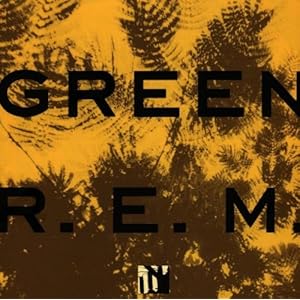 REM - Green (1988)
REM - Green (1988) - It's really hard to pick one favorite REM album as there are so mamy great ones, but Green stands out in my mind for a few reasons. First, while the album has several classic REM rockers ("Orange Crush", "Turn You Inside Out", "Stand", "Pop Song '89", "Get Up"), and the excellent midtempo "World Leader Pretend", it marked the first time that guitarist Peter Buck would heavily feature the mandolin (which would be a trademark on future albums). The three slower, acoustic, mandolin tracks here, "You Are the Everything", "The Wrong Child", and "Hairshirt", are all among the standout tracks on the album. "Everything" features seemingly "stream of consciousness" lyrics that are heartfelt and beautiful. "The Wrong Child", about a child with an unspecified illness and the bullying he or she recieves, is quite possibly one of the most touching and heartfelt songs ever recorded. And despite the grim subject matter, lyricist/singer Michael Stipe gives the child courage and a positive attitude that makes this ultimately a song of hope. I had previously thought Michael Stipe was a good lyricist, but with this album and these songs in particular, I saw a sensitivity and depth that made me begin to consider him one of the best of my generation. Another reason this album is a sentimental favorite for me was it marked the first tour on which I attended a REM concert (This tour was documented on DVD and VHS in "Tourfilm"). And I saw a band not only at the height of their powers, but in Stipe I witnessed an energetic and magnetic frontman with a stage presence that can rival the best of them.
Also recommended by this artist - the entire catalogue; Automatic For the People, Life's Rich Pageant. New Adventures In Hi-Fi, Out Of Time, singles compilations, etc.
 Tears For Fears - Songs From the Big Chair (1985)
Tears For Fears - Songs From the Big Chair (1985) - After their landmark synthpop debut The Hurting, which drew heavily on primal scream therapy for inspiration and featured 4 nonetheless catchy hit singles (at least in the UK), TFF returned for their sophomore effort with a less dark, wider lyrical view, and also a broader palette musically, although retaining much of their signature synth sound. Big Chair was both a critical and commercial success and broke the band in the US. Standout tracks include the anthemic hits "Shout", "Everybody Wants To Rule the World", and Mothers Talk", as well as the Beatlesque grand pop of another hit, "Head Over Heals" - which on the album segues with the rocker "Broken", with the memorable recurring lyrics beginning with "In my mind's eye..." thematically linking both songs. But there is more to the album than just the singles. "The Working Hour" with it's sophisticated, sax-heavy arrangement, the piano ballad "I
Believe", and synth closer "Listen" are all strong, memorable, tracks. There are only 8 tracks on the album but with no weak ones, songwriter Roland Orzabal proved he was no one album wonder.
Also recommended - The Seeds Of Love, Everybody Loves A Happy Ending, The Hurting, Shout: The Very Best of Tears For Fears
 Gary Numan - The Pleasure Principle (1979)
Gary Numan - The Pleasure Principle (1979) - As a young child in 1977, I saw the Main Street Electrical Parade at Walt Disney World for the first time and was COMPLETELY blown away, not just by the sights, but more importantly, the sounds. I had never heard anything like it before. Then one day a few short years later, I heard a song called "Cars" by Gary Numan on the radio which sounded unlike anything else on the radio, yet vaguely familiar due to my love of the synth sounds from the MSEP. My taste in pop music was never the same after that, and my love of "synthpop" was born. The Pleasure Principle, which includes "Cars", was one of the most influential albums in the history of synthpop, and many of it's sounds are stolen, er, borrowed, er "sampled" by contemporary artists today. Moog synthesizer is the main lead instrument featured here, and I love the colorful, spacey, airy sounds and textures of these lead synth lines. Notes are sustained and float into one another, and this sound still sounds "spage-age" to my ears 32 years after the album's release. Interestingly, even with the heavy use of synths, the album features "real" drums and bass guitar, and most intrestingly, real strings. Due to the huge success of "Cars" in the states, Numan was/is unfortunately often pegged a "one hit wonder" in the US, despite having amassed over 20 albums and 40 singles in his career. Just on this album alone, "Cars" is just one of many ace tracks. Other standouts include the instrumental lead-off track "Airlane"; "M.E"; (with an amazing instrumental run out); "Metal", "Films", "Tracks", and the slower, spacey "Complex".
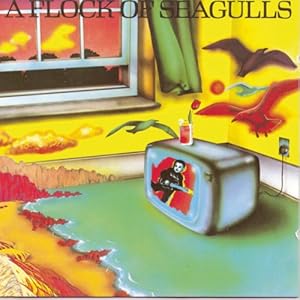 A Flock Of Seagulls (1982)
A Flock Of Seagulls (1982) - There is a common misconception about the UK's A Flock Of Seagulls that they were "one hit wonders" in the US, and just a "hair"/image band. These are both wrong. The Flock had multiple hit singles, and 3 of their earliest were in heavy rotation on both mainstream US radio and MTV. As for the hair and image, yes, the band did have a very distinctive "New Wave"/futuristic look during their early years, but their music had substance as well, introducing a unique "space-age" sound that combined layers and layers of atmospheric, effects-filled guitar sounds with layers and layers of innovative, futuristic, keyboard and synth sounds. What made the band somewhat unique is that their synth-pop contemporaries were generally not using this much guitar, and the guitar-heavy bands of the day were generally not using as much synth. Topping off the sound were a solid rhythm section and vocals which featured lyrics that often had science-fiction and futurism themes, especially in the early years.
The band's self-titled debut album is what I consider their strongest, containing their best and most consistently pleasing set of songs. Highlights include the singles "I Ran (So Far Away)", "Space Age Love Song", and "Telecommunication" the first 2 of which were big hits on both US radio and MTV. Other standouts include "Modern Love Is Automatic", which leads off the UK version of the album with a killer intro; "Messages"; "Don't Ask Me"; and "DNA" which won a Grammy Award for Best Rock Instrumental. Last but not least is the killer closer track, "Man Made", which features an impressive wall of guitar and synth sound, and interesting lyrics that caution of man's overdependence on technology, which seem even more relevant to our modern world than they did when the album was first released - such as "Man made machines/To control the days/Now machines control/While the man obeys."
It should be noted that the UK version of the album is the best bet, as it contains all 11 tracks and includes them in the order the band intended. The US record company distributing the album omitted "Tokyo", and radically resequenced the order of the remaining 10 tracks.
Also recommended - the remaining studio albums, especially second album Listen, which includes the band's other big US hit, "Wishing". Various singles compilations.
 Orchestral Manoevres In the Dark (aka OMD) - Architecture and Morality (1981)
Orchestral Manoevres In the Dark (aka OMD) - Architecture and Morality (1981) - Known to Americans primarily from the 1986 hit, "If You Leave", OMD were actually one of the most influential bands of the synthpop genre and already had 6 studio albums and over a dozen singles under their belt by the time most Americans had a clue as to who they were. Their later albums were more "accessible", "commercial", and varied, and I enjoy all of them, but their first four were among the most influential in all of synthpop. By their third album, Architecture and Morality, OMD were a band at the peak of their powers both creatively, critically, and in the charts (in Europe, anyway). The acclaimed Architecture and Morality proved synthpop didn't have to sound "cold and robotic" - it could sound more organic and have heart, as evidenced on stellar tracks like the stately, longing "Souvenir"; and the related "Joan of Arc" and "Maid of Orleans", all featuring stunning choral effects. All 3 of these tracks were hit singles in UK/Europe and sounded unlike anything else charting in the synthpop genre. "Maid Of Orleans" is actually in waltz time! Other standout tracks include the almost-single "She's Leaving", extremely catchy "Georgia", the experimental instrumental title track, the epic opus "Sealand", and closer track "The Beginning and the End".
Also recommended - the whole catalogue, especially the quirky, experimental, underappreciated but equally brilliant DAZZLE SHIPS, their 4th album, which features a variety of creative textures and sound effects scattered among its songs and song fragments, and was simply too far ahead of its time to get the critical acclaim and sales it deserved at the time of its initial release. Also, any of the singles collections are highly recommended as the group had an amazing run of singles, and they make a good, accessible beginning point for a newbie.
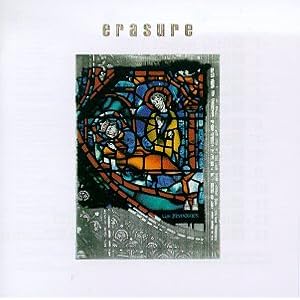 Erasure - The Innocents (1988)
Erasure - The Innocents (1988) - So many great Erasure albums, it's hard to pick one. But The Innocents is my overall favorite. This album is pure pop perfection from start to finish. It features 3 great hit singles - the "Hi-NRG" classic "Chains Of Love" as well as the memorable "A Little Respect" and "Ship of Fools." Synth wizard and songwriter/arranger Vince Clarke seems incapable of writing a song that isn't intensely catchy, which for my taste is a good thing! As such, nearly every track on this album could have been a single, such as "Phantom Bride", "Heart Of Stone", "Imagination", and the positive closer "Weight Of the World". I love the upbeat, positive vibe of Erasure which is very evident on this album and which I find a refreshing change compared to the darker sounds and more gloomy lyrics of many of their contemporaries. Aside from the brilliant keyboard/synth work by Vince, this album features awesome lead and background vocals by lyricist/singer Andy Bell. Bell has a very powerful, soulful voice and sings with a lot of passion and drama. He's one of the only singers I can think of who can get away with a line like "I'm so in love with you/I'll be forever blue" (from "A Little Respect") and make it sound so urgent! Mix in the production by legendary New Wave producer Stephen Hague and you have a classic.
Also recommended - the entire catalogue! Faves include Wild!; The Circus; I Say, I Say, I Say; Wonderland; Chorus; Cowboy; Nightbird; and Erasure. Also Pop! - The First 20 Hits and Pop! - the Second 20 Hits are both recommended due to Erasure's incredible string of singles. (also packages as Total Pop! - The First 40 Hits)
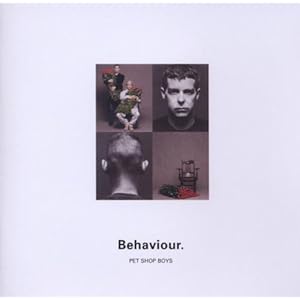 Pet Shop Boys - Behaviour (1990)
Pet Shop Boys - Behaviour (1990) - I've yet to hear a PSB album I disliked, and they've made plenty, so picking a fave is difficult. But overall, I consider this to be the Boys' finest hour. Everything came together brilliantly on this one. The arrangements by composer Chris Lowe are polished, lush, and sophisticated as well as very catchy and memorable. There is a good, balenced mix of the usual PSB danceable songs with more slower and midtempo ones than usual. Ultimately, this 4th album is a very positive, heartfelt, and sincere record with little trace of the detached irony that PSB initially became known for, and singer/lyricist Neil Tennant sings with a convincing earnestness throughout the album. More than 20 years later Behaviour still holds up extremely well and I consider this a major pop classic. Standout tracks include the opener "Being Boring", the killer "This Must Be the Place I've Waited Years To Leave" (which opened the tour), the stunning "My October Symphony"; the uptempo, danceable "So Hard"; ballads "To Face the Truth" and "Nervously"; and "The End Of the World", which, despite the title, is actually a very positive song. I was fortunate to see the "Performance Tour" which supported this album, (at the Sanger Theatre in New Orleans), which at the time set new standards in pop concert theatricality and blurred the line between a Broadway musical and a "rock"/pop concert.
Also recommended - the whole catalogue, such as Actually, Introspective, Bilingual, Please, Very, Release, etc. PopArt singles compilation is highly recommended due to the group's incredible string of singles.
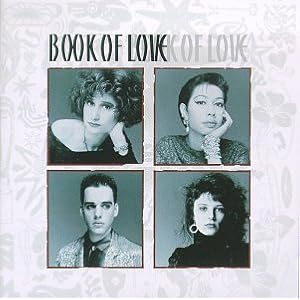 Book Of Love (1986)
Book Of Love (1986) - It was pretty hard to go anywhere in clubland in the late 80's - regardless of what type of dance club you were in - without hearing some of the tracks from this self-titled debut album, which was massive on the club scene. "Boy" and "I Touch Roses" got the most airplay, but the other singles "You Make Me Feel So Good" and "Modigliani (Lost In Your Eyes)" were just as equally solid. The whole album is pretty strong, with "Lost Souls", closer track "Book Of Love" and a cover of Liliput's "Die Matrosen" among the other standouts. This album brings back fond memories of fun and happy times out on the town, dancing until 3 AM and such. And I even got to briefly hang out with the band backstage after one of their local shows (they were very nice and personable)
Also recommended - Lullaby, Candy Carol, and their singles collection.
 Yazoo - Upstairs At Eric's (1982)
Yazoo - Upstairs At Eric's (1982) - After writing Depeche Mode's first album, synth wizard Vince Clarke left the band to form Yazoo (shortened to Yaz in the US to avoid confusion with another band). The debut, Upstairs At Eric's, is one of the definitive moments in synthpop, combining Vince's always catchy synth sounds with the soulful, powerful vocals of Alison Moyet. Detractors of the genre often complained of synthpop sounding cold and robotic, but here was a very warm and soulful, passionate sound. Standout tracks include "Don't Go", "Too Pieces", "Only You", and the dance club smash "Situation". Yazoo would disband after just 2 albums, with Moyet launching a solo career and Clarke teaming up with Andy Bell to form Erasure - the legendary synth due who have recorded numerous albums, had over 40 hit singles, and are still going strong to this day!
Also recomended - their other album, You and Me Both.
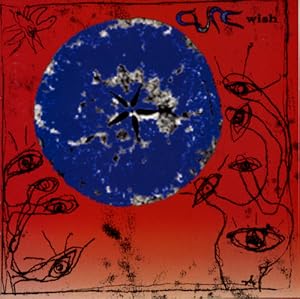 The Cure - Wish (1992)
The Cure - Wish (1992) - To say the Cure's music covers a vast array of styles and moods is a major understatement. (Indeed, their 1996 album is titled Wild Mood Swings). They had one of the most creative, quirky, colorful, catchy, whimsical, and at times, fun and giddy runs of singles in the history of pop music. And yet, many of their album tracks are extremely dark, melencholy, somber, and sometimes edgy and angst-ridden. On many of their albums, this darker material makes up the majority of tracks, such as on the "trilogy" of albums that began with their second album, Seventeen Seconds, in 1980. On 1983's Japanese Whispers, the angst and darkness was largely gone, replaced by the beginning of experimentation with perfecting the 3-minute pop-single, albeit with extremely quirky, creative, and colorful arrangements and lyrics.
The next several albums saw the beginning of the modern Cure. Apart from 1989's Disintegration, which maintained a somber yet majestic mood throughout most of the album, the rest of the albums begining with "The Top" in 1984 were all over the place stylistically and in terms of mood. Three general types of Cure songs began to be identifiable - the eclectic, quirky, colorful, fun and upbeat pop songs; the slow, somber, majestic, mellow, yet often beautiful melencholy songs; and the harder-edged, louder, more guitar-heavy, often angst-driven tracks. In some cases, the transitions between the 3 types of songs on an album was quite jarring, but at least one always got the sense that Cure leader and chief songwriter Robert Smith was very honest and genuine with both his music and lyrics - he was completely open to expressing the complete wide range of human emotion in his work.
1992's Wish contined the Cure tradition of having this wide range of tempos and moods on an album, yet somehow this wide variety of styles seemed to mesh together better on this album than on many previous ones. Wish feels more cohesive and mature than earlier efforts in this vein, and in my opinion it is the Cure's finest studio album, showcasing their mastery of a wide variety of styles and moods both musically and lyrically; and the honesty, range, and emotion of Robert Smith's songwriting.
Standout tracks include my personal favorite Cure song, the upbeat "Doing the Unstuck", which is probably the most positive Cure song ever written (and one of the most positive songs I've ever heard by ANYONE), and which was very nearly a single. Other standouts include the amazing singles "High" and "Friday I'm In Love," which continued the Cure's amazing run of infectiously happy and fun singles. Some critics and some hardcore fans who prefer the band's darker material have been critical of "Friday I'm In Love", calling it TOO happy and upbeat, but they are missing the point. While the music IS infectiously catchy, practically-perfect pop in the tradition of earlier hits like "In Between Days" and "Just Like Heaven", the lyric is subtly tinged with a slight trace of stoic melencholy which provides balance to the song - after all, the happiness being celebrated comes around just once a week, and the song can be seen as a reflection on the often ellusive, transient nature of pure happiness.
It usually wouldn't be a Cure album without some louder, heavier, fast-paced, more aggressive, guitar-driven tracks, and that bill is filled here by lead-off track "Open", "From the Edge Of the Deep Green Sea", "Cut", and closer track "End", which features amazing layers of guitars and awesome basswork by longtime Cure bassist Simon Gallup.
Among the standouts of the slower, majestic, moody songs on the album are "Trust", which features piano and an amazing, beautiful, prominent synth line which, as is often the case with Cure synths, stands in for strings. Another highlight is the de-facto title track, "To Wish Impossible Things", which is a reflection on the darker side of wishes - the ones that can't or won't come true. The melencholic arrangement is nonetheless achingly beautiful and perfectly complements the lyric, making the song a nice counterpoint to "Doing the Unstuck".
Also recommended - All of their studio albums are interesting and have great moments, but being primarily into the band's more upbeat and playful side, my biggest recomendation is for their 2 volumes of singles collections - Standing On A Beach - The Singles (1978-1986) (the CD version is called Staring At The Sea instead), and the sequel, Galore - The Singles (1987-1997)
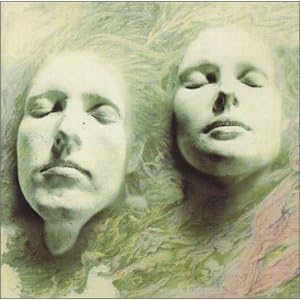 Shelleyan Orphan - Helleborine (1987)
Shelleyan Orphan - Helleborine (1987) - One of the most unique bands I've ever heard, Shelleyan Orphan incorporates a wide variety of classical instruments into their sound, such as violins, viola, cello, woodwinds, and brass. The result is a classically flovored pop music also drawing on folk and at times, jazz influences. Topping it all off are the beautiful vocals of Caroline Crawley, who also often harmonizes with the band's male vocalist, Jemaur Tayle. This is great, relaxing, lively music perfect for driving to on both a beautiful sunny day as well as a dark, mysterious night. But it definitely has an organic feel and makes me think of nature and the outdoors. After getting the coveted opening slot on the 1989 Cure tour, Shelleyan Orphan finally got some exposure in the states, as they also did with the video clip to "Shatter". The album discussed here predates all that, however, as I find it their strongest and purest expression of their sound. Standout tracks include "Southern Bess (A Field Holler)". "Anatomy of Love", "Blue Black Grape", "Jeremiah", "Cavalry of Cloud", and "Midsummer Pearls and Plumes".
Also recommended - entire discography, but especially second album Century Flower, which features their biggest hit, "Shatter".
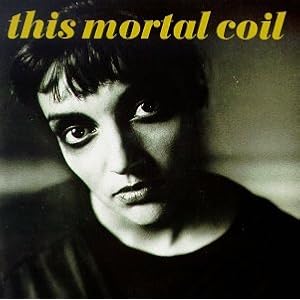 This Mortal Coil - Blood (1991)
This Mortal Coil - Blood (1991) - There are really no words that can completely describe this "side project" of 4AD label founder Ivo Watts-Russell, featuring several different vocalists (mostly female) scattered throughout a double-album's worth of tracks. (a different one on each song, with some appearing more than once per album). You could call it a cross between New Wave and New Age, Pop Music and Ambient Soundscape. TMC's 3 albums consists of ethereal covers of relatively obscure pop songs that display strong emotion, beauty, and at times, sadness. These songs are segued with various instrumental songs and song fragments to create a seamless listening experience with the tracks all flowing into one another and meant to be taken as a complete work, like a Pink Floyd album. Completely unique and at times dreamy, ethereal, dark, moody, somber, sublime, and utterly beautiful. This is the third, final, and IMO best TMC album, (and probably the most accessible to a newbie). And one of the most amazing, creative albums I've ever heard. Standout cuts include "With Tomorrow", "Andialu", "You and Your Sister", "Several Times", "Mr. Somewhere", "Bitter", and "Dreams are Like Water"
Also recommended - It's a judgement call, really, as to which TMC is best. The first two TMC albums It'll End In Tears from 1984 and 1986's double-album Filigree and Shadow both have moments of amazing creativity, brilliance, and beauty and are both worth hearing, as all the praise I heaped on this one could easily apply to those as well.
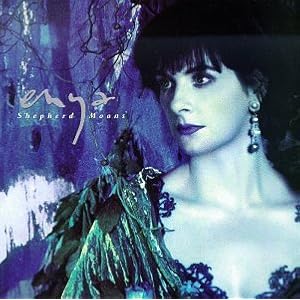 Enya - Shepherd Moons (1991)
Enya - Shepherd Moons (1991) - I really could have picked any Enya album, as I enjoy them all. I really enjoy the lush, relaxing soundscapes and beautiful vocals. Shepherd Moons, the third Enya album, features standout tracks such as "Carrabean Blue", "Ebudae", "Book Of Days", "Lothlorien", and the stuningly beautiful finale, "Smaionite".
Also recommended - Watermark, The Celts, In Memory of Trees, etc.
 Klaus Nomi (1981)
Klaus Nomi (1981) - Over a decade before the heyday of Andrea Bocelli, Sarah Brightman, Charlotte Church, etc., the late, great, Klaus Nomi was an early, (if relatively obscure in his day outside of "New Wave" circles) "classical crossover" or "popera" star. Blending synthpop and postpunk New Wave arrangements with covers of classic opera arias sung in a stunning falsetto SOPRANO, there was literally NO ONE quite like Klaus Nomi in his day, (or since!) both sonically and visually. The colorful New Wave "space alien" persona of many of his appearances would have made him undoubtedly a huge star in the early days of MTV, had he lived that long. Tragically, Klaus passed away just as his star was beginning to ascend, leaving behind only 2 studio albums and some unreleased tracks that were later included on various posthumous compilations. I really could have picked either album, but I went with the debut here, ending as it does with a SUBLIME live rendition of the soprano aria "Mon cœur s'ouvre à ta voix coeur" from the opera Samson and Delilah by Camile Saint-Saens. Other standout tracks on the album include Nomi's New Wave pop classic "Total Eclipse", and covers of pop songs "Lightning Strikes" (Lou Cristie), "The Twist" (Chubby Checker), and "You Don't Own Me" (Leslie Gore), all done in a style uniquely Nomi.
Also recommended - Simple Man (the second album), and compilations. Encore, the first posthumous compilation, is IMO the best, as it has the best overall selection of his pop songs and includes nearly all of his operatic arias. Encore may actually be the best introduction to this artist for a newbie.
 Sarah Brightman - Timeless (1997)
Sarah Brightman - Timeless (1997) - After the Broadway phase of her career, Brightman teamed with producer Frank Peterson (formerly of Enigma) and recorded a solid pop album, Dive. Eventually their recordings began to include more and more operatic arias, beginning with 1997's Timeless, and Brightman would be considered one of the prominent artists of the newly surging "classical crossover" genre, which blends operatic arias with pop songs (often covers) on the same album. This album, then, was at the forefront of that genre, featuring the acclaimed track "Time To Say Goodbye", a duet with Andrea Bocelli. This track became so popular that her American record company changed the name of the album in the US to "Time To Say Goodbye" and put the song first rather than it's intended last position. As solid as that track is, though, it's really on the strength of intended opener "No One Like You" that makes me give this the nudge over, say, the follow-up album, Eden. "No One Like You" adopts Jerry Goldsmith's main score motif from the touching film Powder, and adds lyrics to it that were clearly inspired by the film. This is simply one of the most beautiful songs I've ever heard. Other standouts include a cover of Mecano's "Naturaleza Muerta", the arias "In Trutina" and "La Wally", "In Pace", and "Just Show Me How To Love You", a duet with tenor Jose Cura.
Also recommended - Eden, Dive, Symphony, to name just a few. Various compilations.
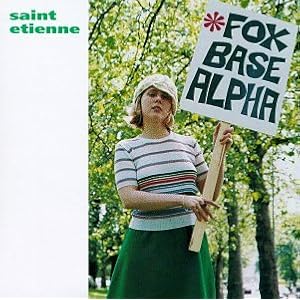 Saint Etienne - Foxbase Alpha (1991)
Saint Etienne - Foxbase Alpha (1991) - At a time when most of pop America was probably too obsessed with grunge and rap to notice, the UK's (where else?) Saint Etienne released a brilliant debut album that is one of my favorite 90's albums and still holds up extremely well today. The album combines elements of dance and house music with sweet and soulful pop melodies and vocals, courtesy of singer Sarah Cracknell, which are reminiscent at times of the great 60's girl groups/singers, such as Dusty Springfield, the Supremes, etc., Like all my favorite electronic/dance oriented records, this has the melodies, too, that are fun to sing along with. The album also features a few "interstitial", experimental-type tracks consisting of looped samples, the most interesting of which is "Wilson". Of the "proper" songs, the euphoric "Nothing Can Stop Us" is hands down one of my favorite 90's singles. Other standout cuts include a killer house cover of Neil Young's "Only Love Can Break Your Heart", the lush and gorgeous "Spring"; "People Get Real"; and "Kiss and Make Up".
 U2 - The Joshua Tree (1987)
U2 - The Joshua Tree (1987) - From the stunning opener "Where the Streets Have No Name" with it's perfect intro and build up, to other great tracks like "Bullet the Blue Sky", "Running To Stand Still", "In God's Country", and of course the mega hits "With or Without You" and "I Still Haven't Found What I'm Looking For", this is not only IMO U2's best album, but one that deserves it's reputation as among the finest rock albums of all time. With excellent production by Brian Eno and Danial Lanois, an excellent rhythm section, the Edge's amazing guitar work, and of course Bono's passionate vocals and lyrics, this album fires on all cylinders. I was fortunate enough to see The Joshua Tree tour in Baton Rouge, LA. It was one of my first concerts and I remember it still as one of the best I've ever attended.
Also recommended - the whole catalogue; The Unforgettable Fire, War, Rattle and Hum, Zooropa, All that you Can't Leave Behind, singles collections, etc
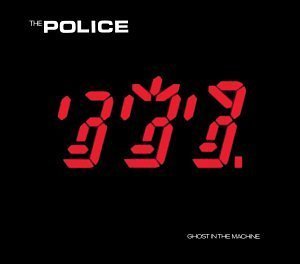 The Police - Ghost In The Machine (1981)
The Police - Ghost In The Machine (1981) - Before his hugely successful solo career, Sting was the basist, lead singer, and principle songwriter of the hugely successful and influential UK postpunk band, The Police. A "power-trio" with a big reggae influence and intellegent, often socially-conscious lyrics, the Police disbanded after their multiplatinum and more polished swansong, Synchronicity, from 1983.
Ghosts In The Machine sees the band transitioning from their more "raw" earlier efforts to the more polished sound of Synchronicity. Keyboards/synths and saxophones are beginning to be featured more prominantly here, joining Sting's bass, Andy Summers' excellent guitar lines, and Stewart Copeland's powerful, accomplished drumming; and the production is more "polished" than on the band's first 3 albums. But the album also feels more closely linked to the band's earlier material than Synchronicity does.
Lyrically, one could say this is something of a concept album, as many of the songs explore themes of the struggle of humanity/spirituality in a mechanized, material world. This theme is also explored by the album title itself, the title (and lyrics) of lead-off track "Spirits In The Material World", and the VERY clever album cover. (Look at it closely to see the 3 faces of the band members trying to materialize amid the electronic digits). Ultimately, the album addresses this primary theme with positivity and hope, and is also a fun listen just to "jam" along to.
Standout tracks include the killer first three tracks, all released as hit singles - "Spirits In the Material World", the infectiously catchy "Every Little Thing She Does Is Magic", and "Invisible Sun". Also "Rehumanize Yourself", "One World (Not Three)", and the spiritual quest of "Secret Journey". But the entire album is very strong.
Also recommended - the band's other 4 albums, Sting's solo albums, and compilations of both.
 Michael Jackson - Thriller (1982)
Michael Jackson - Thriller (1982) - Thriller was Michael's most commercially successful album and the one that earned him his "King of Pop" moniker. But it is also arguably his best work. Everything came together here, from the production of Quincy Jones to Michael's songwriting, (with key contributions from Rod Temperton and a few others) Excellent musicianship and arrangements throughout the album make each song sparkle with energy - from the opening anthem "Wanna Be Startin' Something" to "Thriller", "Beat It", and "Billie Jean", the album flows very well from track to track and features a staggering 7 hit singles among its 9 tracks! The midtempo "Human Nature" features a great arrangement and is one of my favorites on the album.
Also recommended - Off the Wall, which has a first half so strong I almost gave it the nod over Thriller. Also Bad, Dangerous, History, and various compilations.
 Paul McCartney and Wings - Band On The Run (1973)
Paul McCartney and Wings - Band On The Run (1973) - Band On The Run is my favorite album of Paul McCartney's' post-Beatles work; and it is also my favorite release by ANY of the former Beatles after the Beatles disbanded. Even though I initially set a limit of one album per artist upon myself, in hindsight, Wings is technically a different band than the Beatles, so Paul makes my list twice!
I can remember hearing and eventually owning as a single, the title track "Band On the Run" while a toddler and absolutely loving it. This one track was my introduction/gateway not just to McCartney/Wings, but to the Beatles themselves. I particularly remember loving the cool-sounding synths and guitar effects; and the way the song transitioned through multiple phases. This track is a perfect example of Mc Cartney's ability to take seemingly unrelated, complex melodies and arrangements and connect them together perfectly in a way that makes them seem like they naturally belong exactly the way they are presented - like the amazing medley on the second side of the Beatles' Abbey Road album. Here, Paul works that same kind of magic all within one song. This awesome, seemingly effortless, (and always catchy as heck) compositional skill is an example of why "Macca" is my favorite Beatle. (with no disrespect intended towards the other Beatles, who are/were all awesome!).
Other highlights of the album include the equally catchy and upbeat "Jet", the mellow "Bluebird", "Mrs. Vandebilt", "Let Me Roll It", extremely catchy "Helen Wheels", and album closer "Nineteen Hundred and Eighty-Five". It should be noted that this is a rare case of the US edition of an album being superior to the original UK version, because "Helen Wheels" was not included on the original UK edition, due to having been released as a single before the album was released (even though it was recorded during the same sessions as the rest of the album).
Also recommended - other McCartney, Wings, and Beatles albums and compilations. See the Sgt. Pepper entry above for more details.
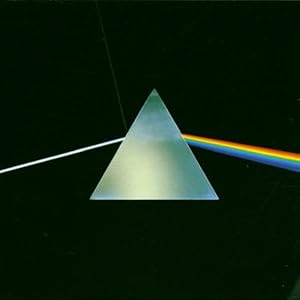 Pink Floyd - The Dark Side Of the Moon (1973)
Pink Floyd - The Dark Side Of the Moon (1973) - The only Floyd album I ever got heavily into. I can appreciate the artistic achievement of The Wall but I find it, taken as a whole, to be a bit of a downer. Dark Side, however, stands up well (for me) for repeat listens, especially when those listens take place in a local planetarium Dark Side laser show in an appropriately "mellow" state of mind!

. There are so many iconic moments here - the heartbeat and chatter that opens and closes the album; the clocks that open "Time"; the guitar solo in "Time"; the excellent lyrics in both "Breathe" and "Time" (and elsewhere on the album); the wailing, soulful female vocals in "Great Gig In the Sky"; "Money" with it's ringing cash registers; the saxophone on "Us and Them"...
"I'll see you on the dark side of the moon."


